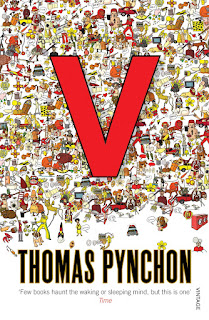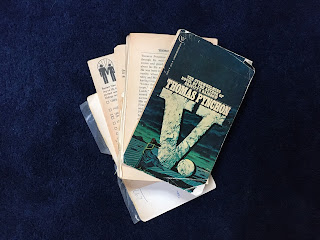Ever since I've been signing up for the European Reading Challenge, there's been these two big historical/encyclopedic novels that turn around Malta I've been thinking about rereading. It turns out this is the year for one, V., Pynchon's debut novel. (The other is Anthony Burgess' Earthly Powers.)"Stencil has stayed off Malta."
But let's see. First, the story: the novel has two interlocking plot lines. One in 1956, (the present, roughly; the novel comes out in 1963) and the other in a series of discrete moments from 1898 to 1943. The protagonist of the present is Benny Profane, in his early 20s, child of a religiously mixed marriage (Jewish/Italian Catholic), born in New York City, recently having served a hitch in the US Navy, but now at odds and ends. (Which things, I think, are basically Pynchon himself, except Pynchon's mix is Episcopal/Catholic, and he grew up further out on Long Island, not in the city itself.) The other timeline is the result of an investigation by Herbert Stencil into a woman V., possibly Veronica Wren, who was, as a teenager, caught up in the assassination of a British spy in Cairo in 1898. Herbert's father is Sydney Stencil, a British Foreign Service agent/spy. V. may (or may not) be Herbert's mother.
Benny is a schlemiel, and is constantly at war with objects: alarm clocks don't wake him; flashlight batteries fail; at one point he tries to rappel down the side of a building and is left hanging upside down. Benny has (imaginary?) late night conversations with a crash-test dummy: they're soul-brothers of a sort, individuals whom the powerful mechanisms of the modern world are out to damage, possibly destroy.
But une guerre contre les objets is the honourable position; the alternative is V., gradually turning herself into an object, glass eye, false teeth, artificial leg. This conflict is Pynchon's theme.
"'I detect allegory in all this,' she said.'No,' said Slab. 'That is on the same intellectual level as doing the Times crossword puzzle on Sunday. Phony. Unworthy of you.'"
"Mountebank is a dying profession; all the good ones have moved into politics."
"Modern readers will be, at least, put off by an unacceptable level of racist, sexist, and proto-Fascist talk throughout this story. I wish I could say that this is only Pig Bodine's voice, but, sad to say, it was also my own at the time. The best I can say for it now is that, for its time, it is probably authentic enough."



